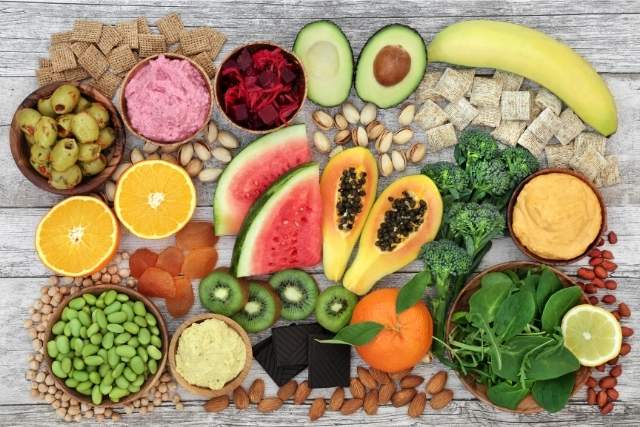Recent Posts
-

- Diabetes-Friendly Nutrition: Smart... 08.12.2024
-

- Nutrition for Chronic... 08.12.2024
-

- Anti-Inflammatory Diet: Food... 08.12.2024
-

- Low-Sodium and Heart-Healthy:... 08.12.2024
-

- Plant-Based Diets for... 08.12.2024
Craving Change? Make Healthy Food Choices Your New Habit!

The only craving that is acceptable is the craving for a healthier you!
Eating what you want is not a crime, and so is choosing to eat more healthy foods. We know that changing your habits for new and healthy ones is a challenging journey. But you know, progress is progress, and always trust the process.
Here’s how you can get started.
Begin at a leisurely pace.
It is far simpler to implement minor adjustments as opposed to major ones. Therefore, make gradual adjustments to the way that you now consume. Try moving from white rice to brown rice or from white bread to whole-grain bread, for instance. Both are healthier options. Drink water instead of beverages that are rich in sugar.
Include some meals that are good for you.
Put more emphasis on improving the quality of the things you eat rather than just cutting out the items that are bad for you. You may, for instance, include veggies in your sandwiches, or you could consist of fruit in your yogurt and cereal.
Whenever it is possible, make your meals from scratch.
It is much easier to keep track of your salt, sugar, and fat intake when you create your meals at home using fresh, whole products. Eating out or purchasing prepared foods makes this task far more challenging. Compared to dining out, preparing meals at home will save you money.
Consume fewer servings at a time (on more compact plates).
Restaurant servings are often enough for two or even three individuals. You may keep your calorie intake under control by selecting an appetizer or a small plate rather than an entrée for yourself or by splitting an entrée with a companion. When dining at home, using smaller dishes might give the impression that you are eating more food than you are. Research has revealed that using a giant plate to eat from makes a person more likely to consume excessive food.
Steer clear of sugary beverages, particularly fruit juice.
Consuming sugary beverages regularly, such as soda and fruit juice, increases the risk of obesity, type 2 diabetes, and cardiovascular disease. Because the fructose in these beverages does not cause the body to experience satiety, those who drink soda tend to eat more calories than those who do not.
Don't be afraid of any fats.
The idea that consuming fat would make you obese is no longer widely held. Your body can't operate properly or absorb nutrients without fat, and essential fatty acids, and omega-3s in particular, are necessary for healthy brain function. Olive oil, almonds, seeds, seafood, avocados, and other foods that contain unsaturated fats like these are regarded to have positive health effects. The key is to avoid trans fats and restrict your consumption of saturated fats.
Be sure to stay hydrated, particularly before your meals.
It is impossible to emphasize the significance of water for consumption. In addition to protecting against constipation and dehydration, it also maintains healthy kidney function. It reduces the risk of developing kidney stones. Additionally, it is connected to the control of one's weight. Reducing caloric intake by drinking water rather than sugary beverages like soda is possible. Further, some research suggests that those who drink water before meals may eat fewer calories overall and find it easier to shed excess weight.
Consume a wide range of protein sources.
Protein is an element that should never be lacking in a diet. Fortunately, one can quickly get protein from both animal and plant sources. Amino acids are the building blocks of proteins. Of these amino acids, nine are essential since the human body cannot create them independently and must instead get them via the diet. Consuming a wide variety of plant-based protein sources, such as legumes, nuts, seeds, and grains in their entire form, is one way to get the whole spectrum of these necessary amino acids. It is generally agreed that poultry, fish, and eggs are superior to red meat and dairy products as protein sources derived from animals.
Eat a handful of almonds as a snack instead of anything processed.
Keeping a bag or container of nuts in your vehicle or purse might help you avoid buying unhealthy snacks and lessen the likelihood that you will put on weight. Recent research reveals that preventing excessive weight gain and lowering the risk of obesity may be accomplished by nibbling on small quantities of nuts daily. Nuts are rich in protein, fiber, and healthy fats, all of which contribute to a feeling of fullness that lasts longer.
Consume the whole spectrum.
Fruits and vegetables often receive their characteristic colors and tastes from phytonutrients like beta-carotene and lycopene. These phytonutrients also contribute to the overall health of the food. In addition, they may aid in preventing illness and have a variety of other positive effects on one's health. Eating various colorful fruits and vegetables is a fantastic approach to ensure you get the full range of phytonutrient benefits.
Disclaimer: The information provided in this article is for general information purposes only. All information in this article is sourced from other websites, and we do not represent any rights regarding the contents and information on the site. All rights belong to their original owner.
Sources:
- Healthy Eating: Changing Your Eating Habits (cham.org)
- Healthy eating: 27 habits that can change your life (usatoday.com)





